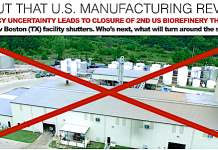by Debra Fiakas CFA
Last week the president of renewable chemicals producer FutureFuel Corporation (FF: NYSE) turned in his resignation. Lee Mikles is around sixty and seems a bit young for retirement. He had been with the company from day one and served as the chief executive officer through the end of 2012. He owns 2.3 million shares of FutureFuel stock or about 5% of the outstanding shares.
Maybe Mikles is just looking for a better paycheck. The last time the company disclosed compensation, Mikles was down for $36,000 in compensation as a director. Along with the CEO and COO, Mikles has not been drawing a salary and receive no cash or stock bonus from FutureFuel. However, looking closer in the fine print of the footnotes, the company discloses that an affiliate of Mikles was paid $132,491 in 2013 related to his services to the company, an arrangement that was followed in all the years he worked for FutureFuel. Similar arrangements were made for the company’s other officers.
Clearly, Mikles and his colleagues were not draining the FutureFuel bank accounts. FutureFuel reported $378.9 million in total sales in the twelve months ending September 2014, providing net income of $49.5 million or $1.14 per share. Operations generated $31.7 million in cash during the same period, implying that for every $1 of sale the company keeps 8 cents. This is not a remarkably high rate, but given that FutureFuel is fairly consistent in generating profits and free cash flow, it takes the company’s cash conversion rate looks impressive.
At the end of September 2014, FutureFuel held $88.6 million in its bank accounts and held another $106.2 million in short-term investments. The company has no long-term or short-term debt. FutureFuel’s financial reports are so impressive it is hard to understand why Mikles would not want to hang around longer and just wallow in the flow of money. Granted it was his name in the press release in December 2014, that announced the company’s intention to reduce the quarter dividend by 50%. The dividend will be $0.24 this year, down from the $0.48 paid in 2014.
Still Mikles has helped preside over strong financial performance. The company sells biodiesel and byproducts of the biodiesel process. There is additional revenue from the sale of ‘renewable identification numbers’ associated with its renewable diesel. FutureFuel turns about about 59 million gallons of biodiesel per year using a mix of oils, tallows and lards as feedstock at a plant in Arkansas. The biofuel segment accounted for about 56% of total sales. The other 44% of revenue comes from sales of specialty chemicals. FutureFuel will produce chemicals to order, but mostly they just sell a line of performance chemicals like solvents, polymer additives, herbicides and bleach activator.
The sales mix has been changing in favor of chemicals as price weakness and reduced demand for biodiesel in 2014, led to a decline in sales value and volume in that segment. Fortunately, some products in chemicals segment have been gaining market share.
What is not growing at FutureFuel is profits. EBITDA adjusted for non-cash expenditures declined to 15.4% of sales in the most recently reported quarter ending September 2014, compared to a much richer 23.3% in the same quarter of the previous year. Both biofuel and chemicals segments have been hit by eroding profit margins. Some might expect the biofuel division to experience a boost if policy makers in the U.S. re-establish a renewable fuel volume obligation and provide some clarity on credits to fuel blenders for using biofuel.
FutureFuel’s future appears to depend upon some serious blocking and tackling to maintain the company’s history of profits. Perhaps it is this daunting task that has Mikles heading to the sidelines – at least in terms of operations. Mikles will remain as a director, but all the troublesome day-to-day decisions for FutureFuel’s future will be someone else headache.
Debra Fiakas is the Managing Director of Crystal Equity Research, an alternative research resource on small capitalization companies in selected industries.
Neither the author of the Small Cap Strategist web log, Crystal Equity Research nor its affiliates have a beneficial interest in the companies mentioned herein.







